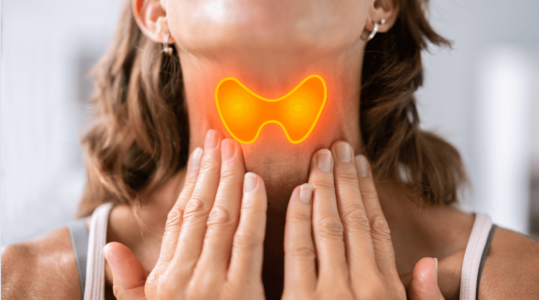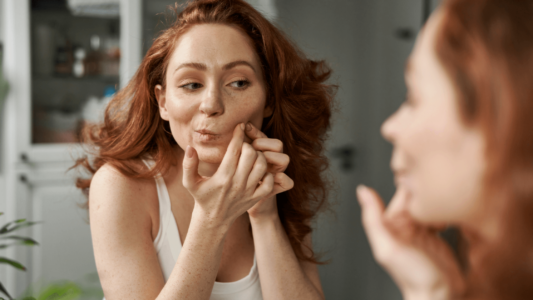
How to Keep Skin Healthy
Your skin is like your calling card— it’s the first thing most people notice about you, so naturally, you want to keep skin healthy and glowing! While plenty of topical treatments can help, the real secret to radiance starts from within.
When we talk about healthy skin, we’re not just talking about appearance. So, whether your concern is redness, itchiness, breakouts, or dryness, addressing these issues means looking beyond the surface.
Yes, healthy skin enhances your appearance (it certainly helps us feel confident), but it also supports its other roles in protecting internal organs, regulating body temperature, sensing touch, and more. Our skin acts as a mirror of our internal well-being.
For instance, chronic stress can trigger breakouts, and a poor diet can contribute to dull, lifeless skin. Underlying health issues like thyroid imbalances or digestive problems can manifest as skin conditions.
In this blog, we will peel back the layers to share the top 5 things that can affect the skin and provide ways to keep skin healthy and glowing.
At CBH Energetics, we look for things that stress your skin, which is part of the Integumentary System: your skin, hair, and nails. Considering these three things work to protect you from external factors, they can get very stressed!
Understanding the Skin
First, let’s learn more about the skin’s many roles! Did you know the skin is our largest organ? It’s a complex structure made up of multiple layers and types of tissues, making up approximately 15% of your body weight!
But skin is more than just a protective covering. Here are some of the amazing things it does!
Protective Shield and Immunity
The outermost layer of the skin, known as the epidermis, acts as a robust barrier against external threats such as viruses and bacteria. This barrier prevents pathogens from penetrating deeper layers and causing infections. Specialized skin cells within the epidermis, like keratinocytes, produce proteins that have antibacterial, antifungal, and antiviral properties, further bolstering its defensive capabilities. We’ll talk more about skin toxins in a bit – but if they come up on your scan, there may be a link to the Immune and Digestive Systems.
Structural Support and Shock Absorption
Beneath the epidermis lies the subcutaneous layer, or hypodermis, which primarily consists of fat tissue. This layer serves as a cushioning shock absorber, protecting the body’s internal organs, muscles, bones, and nerves from physical impacts to keep skin healthy.
Vitamin D Synthesis
When exposed to sunlight, the skin produces vitamin D, essential for bone health, Immune System function, Nervous System health, and the management of certain skin conditions.
Melanin and Sun Protection
Melanin, a pigment found in the epidermis, determines our skin’s color and protects against the harmful effects of ultraviolet (UV) radiation from the sun. It helps prevent sunburn and premature aging and maintains the skin’s elasticity.
Sensory Perception
The skin is equipped with a network of sensory receptors that enable us to perceive touch, pain, pressure, and temperature.
Regulation Through Sweat and Detoxification
The skin helps regulate body temperature through the production of sweat. Sweat glands distributed throughout the skin release moisture, which evaporates and cools the body, preventing overheating. Although sweat’s primary role is to regulate body temperature, it can also carry waste products such as urea, lactate, and certain toxins out of the body.
Now that we know some of the roles skin plays – let’s look at the 5 best ways to keep skin healthy and glowing!
1. Keep Tabs on Your Thyroid for Healthy Skin
 The thyroid is a butterfly-shaped gland located in the neck and is a component of the Endocrine System. It produces hormones that regulate metabolism, energy levels, and overall bodily functions. An imbalance in thyroid hormone levels can lead to noticeable changes in the skin, such as:
The thyroid is a butterfly-shaped gland located in the neck and is a component of the Endocrine System. It produces hormones that regulate metabolism, energy levels, and overall bodily functions. An imbalance in thyroid hormone levels can lead to noticeable changes in the skin, such as:
- Dry and Flaky Skin: An underactive thyroid (hypothyroidism, including Hashimoto’s Thyroiditis) can slow down oil production and lower metabolic rates, making your skin dry and flaky.
- Puffy and Swollen Skin: Hypothyroidism can also cause your skin to swell and become puffy, especially around the eyes, due to fluid retention.
- Excessive Sweating and Oily Skin: An overactive thyroid (hyperthyroidism) revs up your metabolism, increasing sweat and oil production. This can make your skin oily, shiny, and more prone to acne breakouts.
Monitoring your thyroid health usually involves blood tests, but there’s so much more to the story! From a bioenergetic perspective, many systems might show signs of stress related to the thyroid as hormones and metabolism touch almost everything in your body.
Even if bloodwork looks normal, autoimmune markers for conditions like Hashimoto’s might not be checked, leaving many people unaware of their thyroid issues. A full scan can give you a complete picture of how all your systems are working together.
Please note we do not diagnose or treat health conditions with bioenergetics. However, we support the body in returning to balance with bioenergetic testing, which can show organ and system stress.
By understanding and monitoring thyroid health, you can tackle skin issues more effectively and keep skin healthy and glowing!
2. Keep Toxins in Check
 Let’s talk about the unwelcome guests that can crash your skin party—toxins! These sneaky substances can get under your skin (literally) and cause all sorts of trouble. Here’s how some common ones affect your skin and what you can do to kick them out:
Let’s talk about the unwelcome guests that can crash your skin party—toxins! These sneaky substances can get under your skin (literally) and cause all sorts of trouble. Here’s how some common ones affect your skin and what you can do to kick them out:
Trichophyton: This fungus is one of the culprits behind athlete’s foot and other skin issues. It can make your skin itchy, red, and flaky. To keep it at bay, make sure to keep your skin dry and clean.
Formaldehyde: This chemical can be found in some beauty products as a preservative because it prevents bacteria and fungi from growing to extend their shelf life! However, it’s known to cause redness, irritation, and allergic reactions. To keep your skin happy, opt for formaldehyde-free products with safer preservatives.
Parabens: Like formaldehyde, parabens are often found in cosmetics to help extend shelf life. Research suggests that parabens can disrupt the body’s hormonal balance. Look for paraben-free labels or products that use natural preservatives like rosemary oil instead.
Staphylococcus: This bacteria can cause infections, leading to red, swollen, and painful skin. Proper hygiene and cleaning cuts or wounds can prevent these nasty infections.
Propionibacterium: This bacteria loves oily environments and is commonly associated with acne. Regular cleansing and using non-comedogenic products can help keep your pores clear.
Decreasing your toxic load is a big step towards keeping your skin healthy and glowing. For more toxins that impact the skin, read our blog post: The Integumentary System on Bioresonance Testing.
Scan tip: Do you have skin issues, yet your Integumentary dial is balanced on your Full Scan Report? Or is your Integumentary System stressed (in the yellow, orange, or red), yet your skin seems fine? There are always deeper connections between systems and other portions of your report.
If you struggle with skin issues—yet your “skin” dial is blue—look at your Digestive System, liver, or even the Metals section of the toxin list. If your Integumentary dial is stressed, but you think your skin is fine, things like scar tissue or an old tattoo that contains metals can contribute to stress.
3. Include Healthy Fats in Your Diet
Healthy fats, also known as unsaturated fats, are essential nutrients you need to obtain from food that supports various bodily functions, including maintaining healthy skin. They come in two main types: monounsaturated fats and polyunsaturated fats, which include omega-3 and omega-6 fatty acids. These fats provide numerous benefits for overall health and help keep skin healthy.
Healthy fats, particularly omega-3 and -6, are key components of cell membranes. They help maintain the skin’s barrier function, protecting against environmental damage and preventing water loss. Fats keep the skin hydrated by locking in moisture, reducing dryness and flakiness.
Omega-3 fatty acids, which are the most common energetic essential fatty acid imbalances we see on our Full Scan, have anti-inflammatory effects that can help calm irritated skin and reduce the severity of conditions like eczema and acne. Fats also contribute to the skin’s suppleness and elasticity, making it look and feel smoother. They help keep your skin barrier strong and your complexion radiant.
Here’s how you can include them in your eating plan!
Omega-3 Fatty Acids: Add fatty fish like wild salmon, mackerel, sardines, and trout, as well as flaxseeds and walnuts to your meals. Hate fish? Did parasites resonate on your report? This is one of the reasons that fish may come up as an Energetic Food Sensitivity. Taking an Omega-3 fatty acid supplement will give you those much-needed Omega-3 acids without eating fish.
Avocados: Include avocados in your diet. These green gems are packed with healthy fats and vitamins.
Nuts and Seeds: Eat almonds, sunflower seeds, and chia seeds.
4. Nurture Your Gut Skin Connection
Your gut and skin are like best friends—what happens in one often shows up in the other. A healthy Digestive System can do wonders for your skin. When your gut is happy, you get to keep skin healthy and glowing. Here’s how the two are connected and how you can support both:
Poor digestion or an imbalance in gut bacteria can lead to systemic inflammation, which may manifest as skin issues like acne, eczema, psoriasis, and rosacea. For instance, a less diverse gut microbiome is often observed in people with psoriasis, suggesting a link between gut health and this chronic inflammatory skin condition. Similarly, imbalances in gut bacteria can increase systemic inflammation, leading to overproduction of sebum, clogged pores, and acne breakouts.
 Here are some tips to support digestion and, in turn, maintain healthy skin:
Here are some tips to support digestion and, in turn, maintain healthy skin:
Hydration: Drinking plenty of water aids digestion by helping break down food and absorb nutrients more effectively. Staying hydrated is one of the easiest and most effective ways to keep skin healthy. Hydration helps with bowel movements, which are the foundation of your drainage funnel! Proper poops help eliminate toxins, including the breakdown of hormones and waste from your own gut bacteria.
Probiotics: Found in yogurt, kefir, and fermented foods like kimchi and sauerkraut or in supplement form, probiotics promote the growth of good gut bacteria. These beneficial bacteria help maintain a balanced microbiome, reducing skin inflammation and preventing breakouts. Make sure to find a multiple-strain product to ensure variety in your gut microbiome!
Fiber: Foods like fruits, vegetables, and whole grains are rich in fiber, which helps keep your digestive system moving smoothly. This contributes to a moving DIgestive System by binding to toxins that can affect your skin through inflammation and overgrowth if left unchecked. Fiber also supports a healthy gut microbiome by providing food (prebiotics) for beneficial bacteria, which in turn can lead to clearer, more radiant skin.
5. Focus on Skin Enhancing Nutrients
We’ve already mentioned certain foods that help keep skin healthy! What you eat greatly affects how your skin looks and feels. Here are some additional nutrients that are particularly beneficial for your skin:
Vitamin C: Found in citrus fruits, strawberries, and bell peppers, vitamin C helps produce collagen, which keeps your skin firm and youthful. It also has antioxidant properties that protect your skin from damage.
Scan Tip: Do you see Liver or gall bladder stress in your report? Vitamin C is important for Phase One of Liver detoxification. A “sluggish liver” may be connected to skin conditions like acne.
Vitamin E: Nuts, seeds, and green leafy vegetables are rich in this antioxidant, which protects your skin from damage and helps keep it smooth.
Zinc: Found in lean meats, nuts, and whole grains, zinc helps with skin repair and reduces inflammation. It’s especially helpful for acne-prone skin.
Beta-Carotene: Carrots, sweet potatoes, and spinach are packed with this nutrient, which helps protect your skin from sun damage and keeps it looking healthy.
Incorporating these 5 strategies can help keep your skin healthy and glowing at any stage of life. Each element supports your skin’s overall well-being, from managing thyroid health and avoiding toxins to ensuring a diet rich in healthy fats and promoting good digestion.
Consider getting a bioenergetic scan to comprehensively understand what imbalances may be in your essential fatty acids and overall nutritional balance. Our testing can help you understand the link between your Integumentary System and 13 other systems and the toxins that impact them!
DISCLAIMER: Balanced Health, LLC/CBH Energetics and any parent, subsidiary, affiliated or related entities and companies do not provide medical advice or services. This post and the bioenergetic products and services offered by Balanced Health, LLC/CBH Energetics including, but not limited to, bioenergetic tests, bioenergetic scans, bioenergetic reports and related products and services (collectively the “Bioenergetic Products and Services”) are designed for educational and informational purposes only and are not intended to diagnose, treat, cure, or prevent any disease, condition, complaint, illness or medical condition and are not a substitute for professional services or medical advice. Testing is not used for the purpose of obtaining information for the diagnosis, prevention, or treatment of disease or the assessment of a health condition or for identification purposes.


